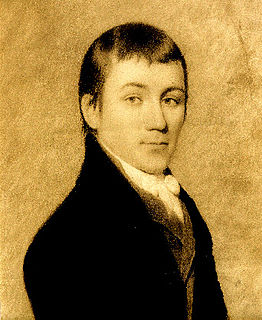A Quote by Charles Brockden Brown
I used to suppose that certain evils could never befall a being in possession of a sound mind; that true virtue supplies us with energy which vice can never resist; that it was always in our power to obstruct, by his own death, the designs of an enemy who aimed at less than our lives.
Related Quotes
Our Last Will and Testament, providing for the only future of which we can be reasonably certain, namely our own death, shows thatthe Will's need to will is no less strong than Reason's need to think; in both instances the mind transcends its own natural limitations, either by asking unanswerable questions or by projecting itself into a future which, for the willing subject, will never be.
Teach him to live rather than to avoid death: life is not breath, but action, the use of our senses, our mind, our faculties, every part of ourselves which makes us conscious of our being. Life consists less in length of days than in the keen sense of living. A man maybe buried at a hundred and may never have lived at all. He would have fared better had he died young.
We dress our garden, eat our dinners, discuss the household with our wives, and these things make no impression, are forgotten next week; but in the solitude to which every man is always returning, he has a sanity and revelations, which in his passage into new worlds he will carry with him. Never mind the ridicule, never mind the defeat: up again, old heart! — it seems to say, — there is victory yet for all justice; and the true romance which the world exists to realize, will be the transformation of genius into practical power.
There is no enemy can hurt us but by our own hands. Satan could not hurt us, if our own corruption betrayed us not. Afflictions cannot hurt us without our own impatience. Temptations cannot hurt us, without our own yieldance. Death could not hurt us, without the sting of our own sins. Sins could not hurt us, without our own impenitence.
Never may an act of possession be exercised upon a free being; the exclusive possession of a woman is no less unjust than the possession of slaves; all men are born free, all have equal rights: never should we lose sight of those principles; according to which never may there be granted to one sex the legitimate right to lay monopolizing hands upon the other, and never may one of the sexes, or classes, arbitrarily possess the other.
We need to be realistic and recognize that there will be times when we won't be sharing our faith out of an overwhelming sense of joy. When that happens, that's a call to look at our own devotional lives. Are we putting our hearts and minds before the Lord and under his cross everyday? Do we remind ourselves continually that we have been ransomed by the death of the Saviour? When we meditate on Christ's death for us, it doesn't mean that we never have struggles in our obedience, but it does help.
At the center of our being is a point of nothingness which is untouched by illusion, a point of pure truth, a point or spark which belongs entirely to God, which is never at our disposal, from which God disposes of our life, which is inaccessable to the fantasies of our own mind or the brutalities of our own will. This little point of nothingness and of absolute poverty is the pure glory of God in us.
Though our brother is upon the rack, as long as we ourselves are at ease, our senses will never inform us of what he suffers. They never did and never can carry us beyond our own persons, and it is by the imagination only that we form any conception of what are his sensations...His agonies, when they are thus brought home to ourselves, when we have this adopted and made them our own, begin at last to affect us, and we then tremble and shudder at the thought of what he feels.
We need not have the loftiest mind to understand that here is no lasting and real satisfaction, that our pleasures are only vanity, that our evils are infinite, and, lastly, that death, which threatens us every moment, must infallibly place us within a few years under the dreadful necessity of being forever either annihilated or unhappy.






































